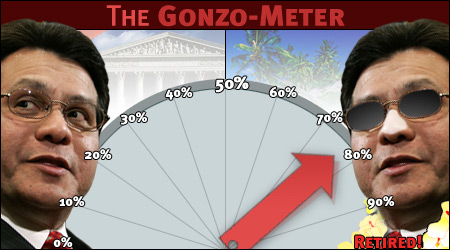Gonzo Update
Who made the decision to fire the USA's and why? According to AG Gonzales, not he and he's not sure why. The same is true for Michael Battle, the former Director of the Executive Office of United States Attorneys, Deputy Attorney General Paul McNulty, Kyle Sampson, and William E. Moschella, the principal associate deputy attorney general, who have all told Congress that they did not put any names on the list.
So, how likely is it that the White House directed these firings as an attempt to stack not only the USA's but the entirety of the DOJ with "loyal Bushies"? I think to answer lies in the first four updates.
Update: The National Journal reported this week that AG Gonzales signed a secret order giving his Chief of Staff, Kyle Sampson and the DOJ's White House liaison "authority over the hiring and firing of most non-civil-service employees of the Justice Department." That liaison later turned out to be 33 year old Pat Robertson Law School graduate and King maker, Monica Goodling.
Under the authority of this delegation, any proposed appointments or removals of personnel who are 'inferior officers' within the meaning of [the] Excepting Clause of the Constitution shall be presented to the Attorney General... and each appointment or removal shall be made in the name of the Attorney General --- March 1, 2006This order was not only hidden from the public --- as it was specifically to be keep from the Federal Register --- but it was also hidden from most of the DOJ brass as it was being drafted.
This secret order was not turned over to either the Senate or House as part of their records requests.
Why would the White House liaison be involved not only in the hiring and firing of DOJ personnel but also as an integral part of making up the "purge lost" along with Kyle Sampson?
Answer: The existence of the order suggests that a broad effort was under way by the White House to place politically and ideologically loyal appointees throughout the Justice Department, not just at the U.S.-attorney level.
Update: After "allegations from an anonymous group of Justice employees that most of those cut from the application lists had worked for Democrats or liberal causes and that Michael Elston, chief of staff for Deputy Attorney General Paul J. McNulty, removed people for spurious reasons that included "inappropriate information about them on the Internet." (i.e they Googled applicants' names to see if they what political ties they had.)
Of course, if true, this would be illegal.
So, the DOJ is now is "removing political appointees from the hiring process for rookie lawyers and summer interns." As "outlined in an internal memo distributed Thursday, (April 26th) returns control of the Attorney General's Honors Program and the Summer Law Intern Program to career lawyers in the department after four years during which political appointees directed the process."
Update: The Office of Special Counsel is investigating Karl Rove and others for violations of the Hatch Act. Monica Goodling, and her efforts to stack the DOJ with "loyal Bushies" is one of those "others.
What is the Hatch Act? Simply it prohibits politicking on government time or using government resources. Scott J. Bloch, head of the Office of Special Counsel, announced that he is investigating three areas: "whether Bush administration personnel violated civil statutes by inserting GOP electoral politics into Cabinet agency meetings, firing at least one U.S. Attorney, and discussing some of the activities in private e-mails that are missing."
For the last several weeks, a little covered House committee investigation has been going on concerning Hatch Act violations over a January meeting where General Services Administration (GSA) Administrator Lurita Doan asked those present at a GSA briefing to consider how the GSA could help Republican candidates in the next round of elections. Karl Roves' deputy, J. Scott Jennings, ran that January meeting.
The White House has since admitted to holding about 20 briefings throughout 2006 and 2007 for federal agency employees to discuss the electability of Republican candidates.
Update: In written accounts submitted to the House Judiciary Committee, some of the fired USA's stated that they were threatened by Michael Elston, chief of staff for Deputy Attorney General Paul J. McNulty that if they did not resign quietly, they would be smeared. McNulty later testified that the USA's were fired for "performance" reasons.
"I believe that Elston was offering me a quid pro quo agreement: my silence in exchange for the Attorney General's." --- former U.S. Attorney for Arizona Paul CharltonYou can read their entire responses at the House's website.
Update: Former Deputy Attorney General James Comey testified Thursday before the Senate. Here are some highlights:
--- Kyle Sampson seems to have intentionally ignored all of Comey's recommendations as to who were the weak U.S. attorneys -- and kept Comey, the #2 at the DoJ, ignorant that Sampson and the White House were targeting certain U.S. attorneys with the goal of firing them.
--- With the exception of USA Kevin Ryan, Comey found no performance problems with any of the fired USAs: "My experience with those [fired] Attorneys was very positive. The names that I have read in the newspaper have not been consistent with my experience."
--- Comey “ had heard rumors" that Justice Department White House Liaison Monica Goodling was using political criteria in making personnel decisions among non-political, career staff.
Today's chance of a Gonzales departure: 77 percent

